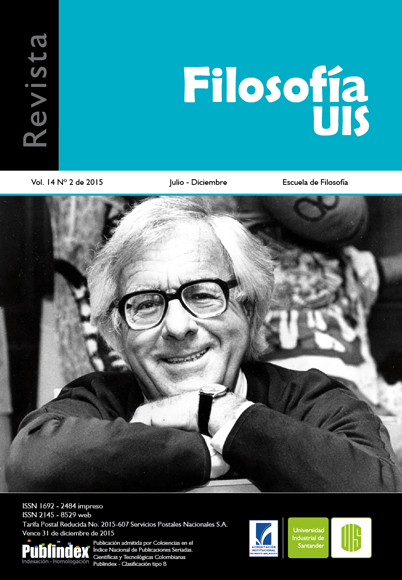Research Article
Sartre: recognition and care of the neighbor as principle of responsible action
Published 2015-12-03
Keywords
- Sartre,
- action,
- moral,
- responsability,
- neighbor
How to Cite
Rubiano, C. A. (2015). Sartre: recognition and care of the neighbor as principle of responsible action. Revista Filosofía UIS, 14(2), 141–165. https://doi.org/10.18273/revfil.v14n2-2015007
Copyright (c) 2015 Christian A. Rubiano

This work is licensed under a Creative Commons Attribution 4.0 International License.
Abstract
The present paper is an approach to Jean Paul Sartre's work. The article defends that the Action Theory of this author it's inseparable from a Moral Theory, therefore a responsible action is one that recognizes and care for others. The text begins by providing an overwiew of certain concepts of Sartre's existentialist philosophy that are fundamental to understand the magnitude and scope of the proposal; then a critical reading of some passages in Sartre's work it's presented to supports the thesis.
Downloads
Download data is not yet available.
References
- Abbagnano, N. (1997). Introducción al existencialismo. Colombia: Brevarios. Fondo de Cultura Económica.
- Abello, I. (2011). Las relaciones conmigo y con los otros a partir de Sartre. Bogotá: Uniandes.
- Adorno, T. (1984). Dialéctica negativa. Madrid: Taurus.
- Allison, H. (1992). El idealismo trascendental de Kant. Una interpretación y defensa. Barcelona: Anthropos.
- Anscombe, G. E. (1991). Intención. Barcelona: Paidós.
- Arendt, H. (2013). Eichmaan en Jerusalén. Bogotá: Debolsillo .
- Davidson, D. (1995). Ensayos sobre acciones y sucesos. Barcelona: Crítica. Grijalbo Mondadori.
- De Gamboa, C. (2005). El carácter empírico e inteligible de las acciones humanas. En W. Herrera, & C. De Gamboa, Kant: defensa y límites de la razón (págs. 83-98). Colombia: Universidad del Rosario.
- Heidegger, M. (2008). El ser y el tiempo. México D.F.: Fondo de Cultura Económica.
- Kant, I. (1978). Crítica de la razón pura. Madrid: Alfaguara.
- Kant, I. (1985). ¿Qué es la ilustración? En I. Kant, Filosofía de la historia (págs. 25- 38). México: Fondo de Cultura Económica.
- Milgram, S. (2009). Obedience to authority. An experimental view. usa: Perennial.
- Popper, K. (1986). El universo abierto. Un argumento en favor del indeterminismo. Madrid: Tecnos.
- Sartre, J. P. (1948a). A puerta cerrada. En J. P. Sartre, Obras. Teatro y estudios literarios (págs. 73-108). Buenos Aires: Losada.
- Sartre, J. P. (1948b). La mujerzuela respetuosa. En J. P. Sartre, Obras. Teatro y estudios literarios (págs. 159-186). Buenos Aires: Losada.
- Sartre, J. P. (2006). El existencialismo es un humanismo. México: Exodo.
- Sartre, J. P. (2008). El ser y la nada. Buenos Aires: Losada.
- Zimbardo, P. (2008). El efecto lucifer: el porqué de la maldad. Barcelona: Paidós.
